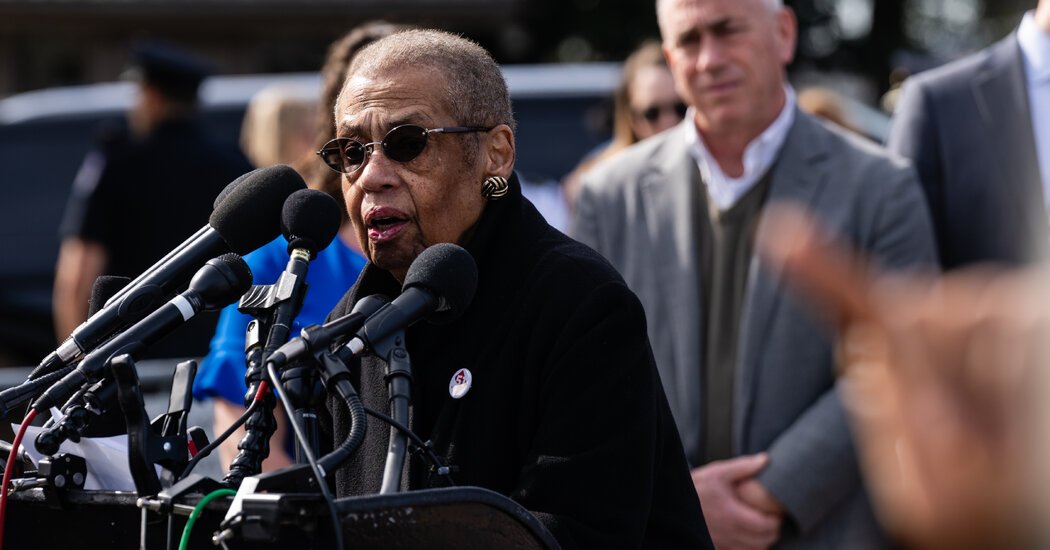When Representative Eleanor Holmes Norton, the Democrat and nonvoting delegate for Washington, D.C., attended a recent gala to accept an award honoring her decades-long career in Congress, she appeared to be struggling to read her brief remarks.
Standing onstage at Arena Stage in April, Ms. Norton referred to the “National Environment for the Arts,” lauded the D.C. theater for contributions to “freedom of suppression and democracy” and half-said, half-spelled the name of a former board chair, Beth Newburger Schwartz, as “Ethel N – E – W Burger Schwartz.”
A pall fell over the audience as Ms. Norton stumbled through her speech, according to an attendee. The scene, which was reported earlier by Washingtonian magazine, was all the more jarring because it followed a video montage celebrating Ms. Norton’s many achievements through three decades in public office, the attendee said.
It served as a vivid reminder of what colleagues and friends said has been a notable decline for Ms. Norton — the civil-rights leader and law professor-turned congresswoman known as D.C.’s “warrior on the Hill” — that has quieted her voice, leaving her vastly diminished and struggling to fulfill her duties as a member of Congress. More than half a dozen of them spoke on the condition of anonymity to avoid publicly disparaging her, though some for years have privately pressed Ms. Norton to reckon with her diminution and decide against seeking re-election.
That message doesn’t appear to have sunk in.
“I’m going to run,” she told reporters at the Capitol on Tuesday, after being questioned about a recent Washington Post report in which D.C. council members raised questions about her ability to do the job and said it was time for her to retire. “I don’t know why anybody would even ask me.”
The reasons are obvious to those who have watched her closely on Capitol Hill. Ms. Norton, who will turn 88 this week, is the oldest member of the House and has become frail.
In hearings, she often sits quiet and alone, sometimes relying on staff aides to remind her where she is. She rarely attends meetings of the Oversight Committee ahead of votes, even though members are encouraged to do so. She sometimes does not seem to recognize people she has known for years.
Ms. Norton’s story is a familiar one in Congress, an institution littered with towering figures who have stayed around well past the prime of their lives. By the time many of them reach the point when colleagues are urging them to step down, they are no longer capable of seeing that they have turned into someone that a younger version of themselves would not recognize.
In Ms. Norton’s case, the signs have been evident for years. Her activity on the House floor has dwindled precipitously. Back in the Congress that began in 2007, Ms. Norton spoke on the floor 41 days, but that number has dropped substantially over the past few years, according to C-SPAN records. So far this year, she has spoken on four days, including Tuesday.
These days, in one-on-one meetings, according to people who have attended them with her, Ms. Norton often converses in vague, five-word sentences. One person who met with her recently described themselves as “shellshocked” by her inability to get through a regular conversation without turning to her staff to fill in blanks.
House Democrats describe her as difficult to reach when she is needed. Public events are also hit or miss, even when they simply require her to read prepared remarks, which sometimes come out garbled.
Ms. Norton declined to be interviewed for this article. Her communications director, Sharon Eliza Nichols, said the congresswoman’s policy was that Ms. Nichols was only allowed to communicate with reporters off the record.
In a lengthy statement issued hours after she told reporters she was running for re-election, Ms. Norton appeared to walk that back somewhat, writing that “through thoughtful discussions with my friends, family, and closest advisers, I’m still considering my options for the next election cycle.”
She also described herself as “among the most effective lawmakers in Congress” and “a tireless advocate for home rule and D.C.’s right to self-government,” rebuking “anyone questioning my ability to continue serving effectively.”
Some of her colleagues are alarmed at her apparent hesitation to retire, and worry that if she follows through with her determination to run again, her well-known name on the ballot, as well as the reservoir of respect and affection for her in Washington, would make it hard for any candidate to defeat her.
But Ms. Norton is unable to function independently, instead relying on a small group of aides, friends and family members to help her through. Her son, John Holmes Norton, helps make personal decisions for her. Donna Brazile, the veteran Democratic strategist and a longtime friend, is often spotted at her Capitol Hill home on the weekends checking in on her and helping tend to her garden. And she leans heavily on her longtime chief of staff, Raven Reeder, to do her job.
There have been signs of decline for years. A viral video of Ms. Norton’s parking her car at the wrong 45 degree angle and repeatedly hitting the car next to her has been racking up views online since 2015.
But in recent months, even staff members who as recently as last election cycle thought that she could soldier on with help are now steering her away from running for a 19th term.
“As her friend and someone who deeply admires her, I’ve made my peace with recommending to her that I think this is her final term,” Ms. Brazile said in an interview. “This is an opportunity to help the District write a new chapter.”
But it is often hard to get through to lawmakers who don’t know any other life other than one in office. Senator Dianne Feinstein, Democrat of California, refused to entertain the idea of resigning before her term ended in 2025, even as she suffered from substantial memory issues and struggled to do the job. Ms. Feinstein died in office in 2023, at the age of 90.
Former President Joseph R. Biden Jr. was defiant in the face of deep concerns about his age and ability to run for re-election and govern.
Last month, Representative Gerald E. Connolly of Virginia died in office at 75, becoming the third House Democrat, all septuagenarians, to do so this year.
“Women and men now in their 80s — they’re all suspect now,” Ms. Brazile said. “But it’s a generation that believes in service and paying it forward. This is a moment for Eleanor to decide, and I hope she makes the right decision. When she makes that decision, I don’t know.”
Ms. Norton’s decline is coinciding with a critical moment for the place she has represented since 1991, as President Trump and Republicans in Congress have taken aim at the District of Columbia. A bill to restore more than $1 billion to Washington, D.C.’s budget that Congress blocked in March has stalled for months in the House amid Republican resistance.
House Republicans this week also moved on legislation that would undo three local measures passed by D.C. officials, chipping away at the city’s autonomy. On Tuesday, they pushed through a bill that would bar noncitizens from voting in local elections and another that would strip provisions from a law intended to make it easier to discipline police officers for misconduct. A third measure to force D.C. officials to comply with federal immigration policies was scheduled for a vote later in the week.
On Monday, D.C.’s mayor, Muriel Bowser, declined to say she had confidence in Ms. Norton and her ability to do her job.
“I am really focused on making sure our city is strong politically and stable economically, and I think there is time for talking about elections, and I don’t choose to do that right now,” Ms. Bowser said.
Ms. Norton represents Washington as a nonvoting member. But to people concerned about her inability to perform, that only makes her current condition more alarming. While nonvoting delegates can introduce legislation and serve on committees, they have no ability to sway a vote on the floor, meaning that their power depends on how effective and forceful they are at advocating for their interests and persuading other lawmakers to side with them. One member described the job as effectively being a lobbyist with a built-in office and congressional staff.
In her prime, Ms. Norton was an unstoppable and ubiquitous force in Washington.
Making an impassioned case for voting rights for the District of Columbia in 2007, she bellowed into the House chamber when asked by a Republican colleague to yield her time.
“I will not yield, sir,” Ms. Norton said, chopping her hand through the air. “The District of Columbia has spent 206 years yielding. To the people who would deny us the vote, I yield you no ground.”
She would often pop up at local meetings outside of the Capitol, and in the 1990s, she helped to end the city’s financial crisis by transferring billions of dollars in unfunded pension liabilities to the federal government. Twice, she led the fight in the House to pass a D.C. statehood bill.
On Tuesday, there was little trace of that passionate advocacy. When she rose to speak against the anti-home rule legislation, Ms. Norton leaned on a lectern as she read from printed pages, ending her speech simply by saying, “I yield.”
“Like California, D.C. is a progressive jurisdiction under MAGA attack,” Representative Jamie Raskin, a Maryland Democrat representing a neighboring district and a close ally of Ms. Norton’s, said in an interview. “It doesn’t have California’s political resources or leverage to fight back, but it’s got an engaged citizenry and the nonvoting delegate position, which is a critical bully pulpit for the District.”
But Mr. Raskin added a gentle nudge for Ms. Norton to move on.
“Eleanor is an icon who brought the spirit of the civil rights movement from the 20th century into the 21st, but it’s going to take a new generation of leadership to win statehood and the battles of the day,” he said.
Kelly Mikel Williams, who has worked in local and federal government in various roles and is planning to challenge Ms. Norton for a second time, said she should not have been elected last year when her decline was already clear.
“Too many voters gave her a pass; they let her sit on her laurels of 30 years ago, as opposed to looking at what she’s doing right now,” he said. “I can’t imagine why she’ll be running again when she’ll literally be almost 90 years old. It doesn’t make any sense to me. I would prefer she go out on a high note, rather than have her legacy washed away.”
Michael Gold contributed reporting.




